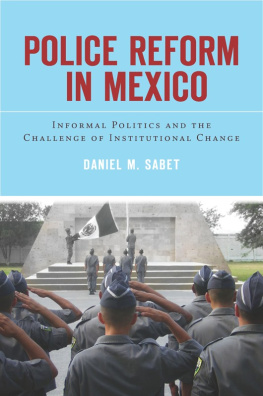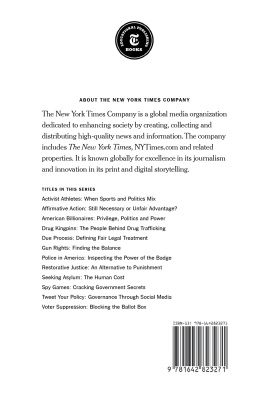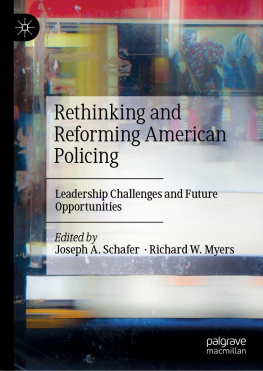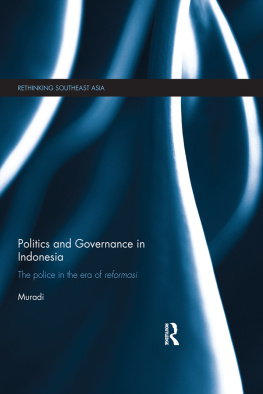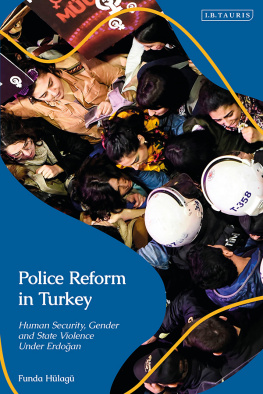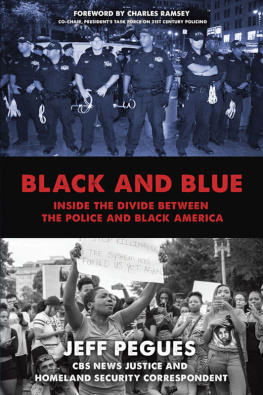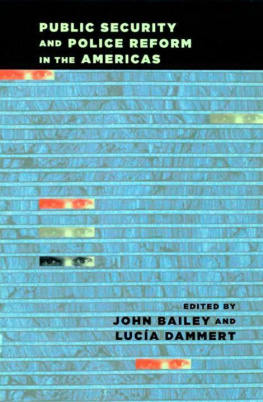Stanford University Press
Stanford, California
2012 by the Board of Trustees of the Leland Stanford Junior University. All rights reserved.
No part of this book may be reproduced or transmitted in any form or by any means, electronic or mechanical, including photocopying and recording, or in any information storage or retrieval system without the prior written permission of Stanford University Press.
Printed in the United States of America on acid-free, archival-quality paper
Library of Congress Cataloging-in-Publication Data
Sabet, Daniel M., 1976 author.
Police reform in Mexico : informal politics and the challenge of institutional change / Daniel M. Sabet.
pages cm
Includes bibliographical references and index.
ISBN 978-0-8047-7865-7 (cloth : alk. paper)
ISBN 978-0-8047-8206-7 (ebook)
1. Police administrationMexico. 2. PoliceMexico. 3. Police professionalizationMexico. I. Title.
HV8161.A3S23 2012
363.2068'4dc23 2011046226
Typeset by Westchester Book Services in 10/14 Minion.
Written in honor of those many police officers who are fighting for a professional, honest police force.
Ac knowledgments
There are many people whose help and support have made this book possible. First, I would like to thank Georgetown Universitys School of Foreign Service for their generous funding and support for this research project.
I owe a great debt to colleagues at the National Strategy Information Center (NSIC), including Jeff Berman, Roy Godson, Jane Grabias, who gave me the opportunity to work with and learn about the challenges confronting Latin American police forces. During my time at NSIC, U.S.-based police officers Jorge Gaytan, Andy Mills, David Contreras, Don Gosselin, Manny Rodriguez, and Dennis Kenney helped provide me with a U.S. perspective on policing. In addition, numerous police and public officials in Mexico, Colombia, and Panam helped me understand the challenges of institutional change in their respective departments, including Jos Luis Montoya, Alejandro Lora, Esther Cruz Martnez, Javier Salas Espinoza, Rosario Medrano, Francisco Javier Luna Poyorena, Fabin Galindo, Rafael Buelna Rodrguez, Humberto Lpez Favela, Rafael Ramrez Leyva, Ivan De La Garza Santos, Aroldo Prez Porras, Wilfredo Miranda, and Fernando Torres.
Several research assistants provided invaluable assistance throughout the course of this project, including Alejandro Hernandez, Diana Murray Watts, Marcos Baez Moreno, Carla Tena Unna, and Louise Ashton. Their many hours spent reviewing newspaper articles and government documentation, following up on information requests, and translating articles are very much appreciated.
There are a number of U.S.-based colleagues who offered valuable advice and food for thought in conversations and writings, and through their comments on drafts, including David Shirk, Andrew Selee, John Bailey, Shanna OReilly, Eric Olson, Robert Donnelly, Diana Negroponte, Lazaro Cardeas, Jaime Arredondo Snchez, Octavio Rodriguez, Shannon ONeil, and James Creechan, and anonymous reviewers. The large and growing community of academics in Mexico working on issues of public security was enormously helpful in illuminating the complexities of Mexican policing. In particular, I would like to thank Mara Eugenia Surez de Garay and also Elena Azaola, Antia Mendoza, Juan Salgado, Marcos Pablo Moloeznik, Marcelo Bergman, Arturo Arango, Carlos Silva, Marco Antonio Carrillo Maza, Ernesto Lpez Portillo, and Jos Arturo Yez.
Close to two hundred people were interviewed as part of this research, and while I cannot mention each by name, I am grateful that they were willing to share their time and knowledge with me. I never ceased to be amazed by the openness, kindness, and desire to improve policing in Mexico. Several individuals played an invaluable role in facilitating the research, including Luis El Barbaro Jefe Manzanera, Fernando Torres, ngel Briam Gutierrez, Julian Dominguez, Susana Alvarado Lopez, Martha Santana Valenzuela, and Jos Carlos Vizcarra Lomel.
I also would very much like to thank the many police chiefs who not only participated in the study but opened the doors of their police departments, organized interviews, and provided documentation, including Lzaro Gaytn Aguirre, Javier Aguayo y Camargo, Juan Manuel Pavn Flix, Ramss Arce Fierro, Carlos Huerta Robles, Alonso Ulises Mndez Manuell-Gmez, Alberto Capella Ibarra, and Julan Leyzaola Prez.
Finally, and most importantly, I owe a great debt to Shanna and the rest of my family for their continuous love and support.
Two Realities
Jos Luis Montoya
In 1995, the National Action Party candidate (PANPartido Accin Nacional) won the mayorship of Mexicali, Baja California. It was the first time since Baja California became a state in 1953 that Mexicali would be governed by a party other than the traditionally dominant Institutionalized Revolutionary Party (PRIPartido Revolucionario Institutional). The new mayor, Eugenio Elorduy Walther, promised to usher in a period of reform, and the local police force was a major focus for the new administration. Jos Luis Montoya remembers it as an exciting time. In 1996, he graduated from the newly created municipal police academy as part of the first generation of cadets to receive formal police training in Mexicali. He remembers that they felt special: like they were going to be different from the police who had come before them. As the police force purchased new equipment and police cars and invested in training and education, there was a sense that the Mexicali police were on a path toward modernization and professionalism.
After seven years of service, in 2003, Jos Luis Montoya was promoted to the position of supervisor, roughly the equivalent of a sergeant in many U.S. police forces, and given command over twenty men. He remembers his promotion fondly as his first opportunity to do policing the way that it was supposed to be done: working with citizens and doing honest police work. Recognizing that corruption was commonplace in the department, he told his men of his intentions and requested that anyone who was not in agreement ask to be removed from his command.
Montoya was assigned a dangerous low-income community with a history of drug dealing and consumption problems. Drug sales were technically federal crimes and not within his jurisdiction; however, the federal government did not have the capacity to enforce drug laws at the neighborhood level throughout the country. As a result, this major source of crime and violence went largely unaddressed. Moreover, it was common for municipal police to look the other way about drug dealing and accept a little money from dealers in exchange. Their technical lack of jurisdiction gave such deals political cover. In many respects, things had improved dramatically since Elorduy was elected mayor, but corruption was still a daily part of police work.

